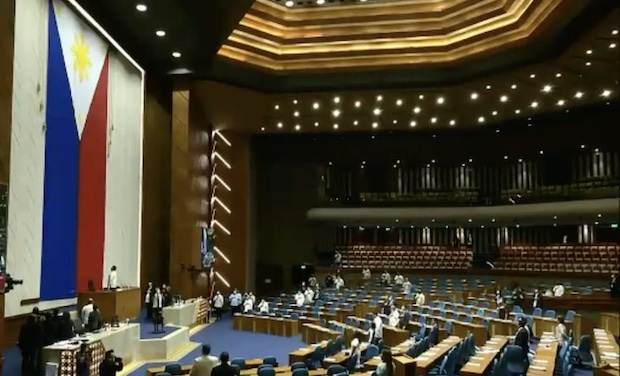
The House of Representatives started the first regular session of the 19th Congress on Wednesday, Aug. 3, 2022. (Photo from a Livestream posted on the Facebook account of the House of Representatives)
MANILA, Philippines – A bill taxing transactions with foreign digital service providers (DSPs) like Netflix and Spotify has won the approval of the House of Representatives in its third and final reading.
House Bill No. 4122, which proposes the imposition of a 12 percent value-added tax (VAT) on digital transactions in the country, was passed during the plenary session on Monday with 253 lawmakers in favor, four in opposition, and one in abstention.
Under the measure, however, DSPs providing services to the government will only be charged with a five percent VAT.
Meanwhile, educational services under duly accredited institutions that use subscription-based platforms will be exempted from VAT.
‘Not the way forward’
Justifying her negative vote, Gabriela Rep. Arlene Brosas called this proposed measure “another regressive tax measure.”
“While it is true that the playing field must be fair, especially to local online digital service providers who are already imposing VAT on digital goods and services, we believe levying a new tax in the form of digital tax on other streaming services and digital transactions is not the way forward,” she explained.
The Makabayan lawmaker also echoed her earlier sentiments remove word: made about the bill seeking to tax single-use plastic bags, which was likewise passed by the lower chamber in its third and final reading.
READ: House OKs on final reading bill imposing tax on single-use plastic bags
“Iyong mga ordinaryong mamamayan pa rin ang papasan ng 12 percent digital tax na ito sa porma ng mas mataas na subscription fees sa online platforms tulad ng Netflix at Spotify,” she said.
(Ordinary people will again bear the brunt of this 12 percent digital tax in the form of higher subscription fees on online platforms like Netflix and Spotify.)
Brosas pointed out that people using DSPs like Canva and Zoom to help with their learning but are not used under accredited educational institutions, will also be affected by this measure.
“Sa halip na digital tax, mahigpit ang assertion namin na dapat ikunsidera ang wealth tax na tiyak na lilikha ng mas malaking revenues kumpara sa panukalang digital tax,” she said, claiming that at least P98 billion will be generated by imposing a wealth tax on the top 20 billionaires in the country.
(Instead of imposing the digital tax, we are strictly asserting to consider wealth tax, which will bring forth a bigger revenue than the proposed digital tax.)
A counterpart bill filed by Senator Pia Cayetano has yet to hurdle the upper chamber.
President Ferdinand Marcos Jr. had also backed the bid to tax DSPs during his first State of the Nation Address last July.
READ: Bongbong Marcos: Impose VAT on digital service providers
But activist group Bayan Muna has since called to junk proposals taxing online streaming services as, it said, only the poor and middle-class customers who turn to these websites for entertainment will be burdened by this move.
RELATED STORIES:
PH urged to tax digital platforms, online transactions
Plans to tax online products will only hit poor, middle class — Bayan Muna

